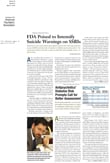The Virginia House of Delegates took a step last month to change the law barring private companies from offering health insurance benefits to employees’ domestic partners and other household members.
This is an important issue for APA, because the Association did not realize when it signed a lease to move its headquarters from Washington, D.C., to Virginia in December 2002 that the law in its new home state would not allow it to continue offering health care coverage for unmarried partners of its staff, as it has done for several years. APA learned of this situation when it informed its health insurance carrier about the new address.
In a fortuitously timed move, a bill was introduced in the current session of the state legislature to change the law.
The bill would give businesses the option of extending health insurance coverage to unmarried partners of same-sex or opposite-sex couples or to other members of an employee’s household. The current law limits such coverage to employees’ legal spouses and children.
Last month APA testified before the House of Delegates committee with jurisdiction over the bill to change a law that APA Medical Director James H. Scully Jr., M.D., characterized as “wrong-headed.”
He also wrote in a letter to the editor of Washington, D.C.,’s gay-oriented newspaper, the Washington Blade, that APA had begun to work hard “to let other employers know that as long as the law stands, moving to Virginia is a mistake.”
In a vote later on the day that APA and other business interests testified, the very-conservative Virginia House Commerce and Labor Committee narrowly voted to report a bill to the House floor that would allow the state’s private employers to extend health benefits to domestic partners of employees.
A week later, on February 17, several days after Human Resources Director Linda Neely testified in favor of the bill on behalf of APA, the full House of Delegates passed the bill by a two-vote margin.
The fate of domestic-partner benefits in the Old Dominion hinges on the vote of the state Senate. Virginia’s legislative session ends March 16; if the Senate does not act by then, the bill will die.
William Kocol, a spokesperson for the nonpartisan advocacy group Equality Virginia, which lobbies for equal rights for gays and lesbians in the state, noted that the bill will likely find the Senate more receptive than the House, so the bill has a good chance of reaching the desk of Gov. Mark Warner (D), who has been a strong supporter of gay rights and has indicated he will sign such legislation.
Scully has also written a letter to the chair of the Virginia Senate committee to which the bill has been assigned, urging him to support the relaxation of the insurance restriction. Appealing to Virginia’s reputation as a very business-friendly state, Scully said, “From a business perspective, we are now at a competitive disadvantage to professional associations in Maryland and D.C., which are able to offer domestic-partner benefits. Such benefits are inexpensive, but pay off handsomely in terms of productivity and morale.”
Scully added, “APA has been hindered by this unwarranted intrusion into how it competes in the employment marketplace.”
Scully also noted that such a restrictive law just adds to the number of Virginians compelled to go without health insurance.
